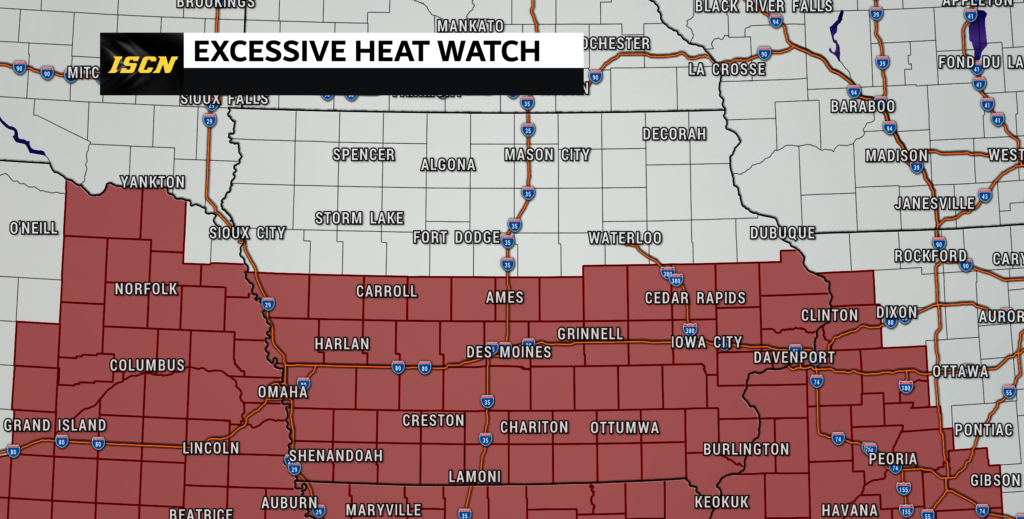
As the summer season intensifies, Iowa is gearing up for a potentially dangerous heatwave. An Excessive Heat Watch has been issued for various parts of the state, indicating the onset of perilously high temperatures.
Here’s What You Need to Know:
- Severity: The heat index, a measure that combines temperature and humidity to reflect the actual perceived temperature, is anticipated to reach 105 to 110 degrees. This sweltering condition is expected to persist for several days from Saturday into the following week.
- Affected Areas: The heat alert has been segmented into a few primary zones:
- Saturday afternoon through Tuesday evening: This watch covers portions of far west-central to southwest Iowa, counties that reside closer to I-29.
- Saturday afternoon through Monday evening: This subsequent watch encompasses areas along and west of I-35.
- Sunday afternoon through Monday evening: This watch covers counties east of I-35.
- Potential Impacts: The combination of extreme heat and humidity significantly heightens the risk of heat-related illnesses. Those participating in outdoor activities, or without access to air conditioning, are particularly vulnerable.
- Record-Breaking Heat: This isn’t just a typical heatwave; it’s potentially historic. For instance, Lincoln might surpass a record set in 1962 with a forecasted high of 102 degrees, while Norfolk could break its 1914 record with a predicted high of 101 degrees on Monday.
Safety First: How to Protect Yourself and Loved Ones
Given the impending heatwave, it’s essential to prioritize safety:
- Stay Updated: Regularly monitor weather forecasts and warnings. Conditions can change swiftly, and staying informed is paramount.
- Hydrate: Drink ample water throughout the day. Avoid beverages like caffeine and alcohol that can dehydrate the body.
- Seek Shelter: Whenever possible, stay indoors in an air-conditioned environment. If you lack air conditioning, consider visiting public places such as malls or libraries to cool down.
- Limit Outdoor Activities: If outdoor activities are unavoidable, aim for cooler parts of the day, like early mornings or late evenings.
- Check on Vulnerable Individuals: Elderly individuals, young children, and those with specific medical conditions are more prone to heat-related illnesses. Ensure their safety by checking on them regularly.
- Never Leave Children or Pets in Cars: The interiors of vehicles can reach lethal temperatures rapidly during a heatwave. Always ensure that children and pets are not left unattended.
Iowa residents are urged to take these warnings seriously. By staying informed, taking necessary precautions, and looking out for one another, we can weather this heatwave safely. Stay hydrated and cool, Iowa!
Monitor the latest forecasts and warnings for updates on this situation.
What is the difference between a heat advisory, an excessive heat watch, and an excessive heat warning?
- A Heat Advisory means that temperatures of at least 100°F* or Heat Index values of at least 105°F* are expected generally within the next 24 hours. Consider postponing or rescheduling any strenuous outdoor activities. If you must be outside, be sure to drink plenty of water and take frequent breaks in the shade. The young and elderly and those with medical conditions should use extra caution outdoors.
- An Excessive Heat Watch means that Heat Index values are expected to reach or exceed 110°F* and not fall below 75°F* for at least a 48 hour period, beginning in the next 12 to 48 hours. Plan to suspend all major daytime outdoor activities if a warning is issued. If you do not have air conditioning, locate the nearest cooling shelter or discuss staying with nearby family or friends who have A/C.
- An Excessive Heat Warning means that Heat Index values are expected to reach or exceed 110°F* and not fall below 75°F* for at least a 48 hour period, beginning in the next 24 hours. Refrain from outdoor activities of any nature during the warmest time of the day. Drink plenty of water and take frequent breaks if you must be outside. Stay indoors in an air conditioned building as much as possible. Check on elderly family members if they are living alone.
What is the heat index?
The Heat Index is sometimes referred to as the “apparent temperature” and is a measure of how hot it feels outside to the human body. The HI includes the influence of both the actual air temperature and relative humidity. As either value increases, the apparent temperature also increases. The reason why the apparent temperature increases with relative humidity is due to how the body cools itself. The body dissipates almost 90% of its heat through skin perspiration (sweat). Sweating by itself does nothing to cool the body unless the water is removed by evaporation–and high relative humidity hinders evaporation.